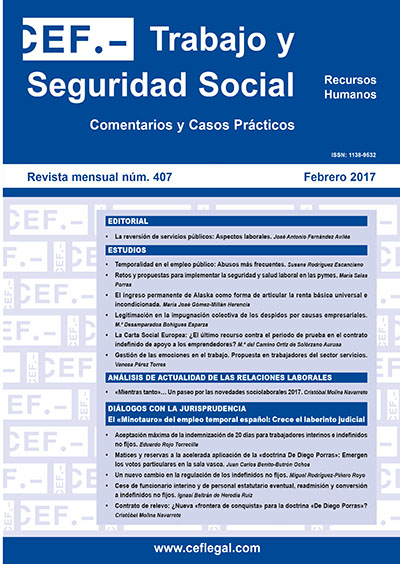Emotions in the workplace. A proposal to diagnosis and intervention in service jobs
DOI:
https://doi.org/10.51302/rtss.2017.1942Keywords:
emotions in the workplace, emotional work, emotional regulation, burnout, job involvementAbstract
It is essential for organizations to understand the relationship between emotions and psychosocial risks. The investigation suggests that high emotional demands resulting from interactions with clients can be relations with burnout. This article reports research on emotion work as predictors to the job involvement and burnout in employees of the service sector. In addition, this research explores the moderating role that emotional regulation can have in coping with the emotional demands of jobs. Also included is a proposal for the development of emotional regulation skills for workers as a protective factor against these role demands. Findings revealed that the expression of positive emotions is related to the job involvement, increasing the psychological identification with the job. Moreover, the sensitivity requirements (the requirement to sense the emotion of the interaction partner) and emotional dissonance (the dissonance between felt and displayed emotions) increase the likelihood of participants having burnout. Finally, emotional regulation appears as a moderating variable in the relationship between emotional work and burnout, cushioning the effects that emotional exhaustion and cynicism have on the health of the worker. The recommendation is to strengthen the skills of emotional regulation through the training and development of skills in those workers exposed to high interactions with clients as a protective measure in psychosocial risks.
Downloads
References
Barsade, S. [2002]: «The Ripple Effect: Emotional contagion and its influence on group behavior», Administrative Science Quartely, núm. 47, págs. 644-675.
Carrasco, H.; Martínez-Tur, V.; Moliner, C.; Peiró, J. M. y Ramis, C. [2014]: «Linking emotional dissonance and service climate to well-being at work: A cross- level analysis», Universitas Psychologica, núm. 13 (3), págs. 947-960. http://dx.doi.org/10.11144/Javeriana.UPSY13-3.leds.
Fernández-Berrocal, P.; Extremera, N. y Ramos, N. [2004]: «Validity and reliability of the Spanish modified version of the trait meta-mood scale», Psychological Reports, núm. 94, págs. 751-755.
González, L. y De Elena, J. [1999]: «Medida de la implicación en el trabajo: Propiedades psicométricas y estructura factorial del cuestionario "Job lnvolvement"», Revista de Psicología del Trabajo y de las Organizaciones, núm. 15 (1), págs. 23-44.
Gracia, E.; Ramos J. y Moliner, C. [2014]: «El Trabajo Emocional desde una perspectiva clarificadora tras treinta años de investigación», Universitas Psychologica, núm. 13 (4), págs. 1.517-1.529.
Grandey, A. [2003]: «When "The Show Must Go On": Surface Acting and Deep Acting as Determinants of Emotional Exhaustion and Peer-Rated Service Delivery», Academy of Management Journal, núm. 46 (1), págs. 86-96. doi: 10.2307/30040678.
Gross, J. [2002]: «Emotion regulation: Affective, cognitive, and social consequences», Psychophysiology, núm. 39, págs. 281-291. doi: 10.1017.S0048577201393198.
— [1998]: «The emerging field of emotion regulation: An integrative review», Review of General Psychology, núm. 2, págs. 271-299.
Gursoya, D.; Boylub, Y. y Avcic, U. [2011]: «Identifying the complex relationships among emotional labor and its correlates», International Journal of Hospitality Management, núm. 30, págs. 783-794. doi:10.1016/j.ijhm.2010.10.009.
Hatfield, E.; Cacioppo, J. y Rapson, R. [1994]: Emotional contagion, New York: Cambridge University Press.
Henning-Thurau, T.; Groth, M.; Paul, M. y Gremler, D. [2006]: «Are all smiles created equal? How emotional contagion and emotional labor affect service relationships», Journal of Marketing, núm. 70, págs. 58-73.
Hochschild, A. R. [1983]: The managed heart, Berkeley: University of California Press.
Hülsheger, U.; Lang, J.; Schewe, A. y Zijlstra, F. [2015]: «When Regulating Emotions at Work Pays Off: A Diary and an Intervention Study on Emotion Regulation and Customer Tips in Service Jobs», Journal of Applied Psychology, núm. 100 (2), págs. 2639*277. doi.org/10.1037/a0038229.
Hülsheger, U. y Schewe, A. [2011]: «On the costs and benefits of emotional labor: A meta-analysis of three decades of research», Journal of Occupational Health Psychology, núm. 16, págs. 361-389. doi.org/10.1037/a0022876.
Mababu, R. [2012]: «El constructo de Trabajo Emocional y su relación con el Síndrome del Desgaste Profesional», International Journal of Psychology and Psychological Therapy, núm. 12 (2), págs. 219-244.
Martínez-Íñigo, D. [2001]: «Evolución del concepto de trabajo emocional: dimensiones, antecedentes y consecuentes. Una revisión teórica», Revista de Psicología del Trabajo y de las Organizaciones, núm. 17 (2), págs. 131-153.
Martínez-Íñigo, D.; Totterdell, P.; Alcover, C. y Holman, D. [2007]: «Emotional labour and emotional exhaustion: Interpersonal and intrapersonal mechanisms», Work and Stress, núm. 21, págs. 30-47. http://dx.doi.org/10.1080/02678370701234274.
Mayer, J.; Salovey, P. y Caruso, D. [2000]: «Models of emotional intelligence», en R. J. Sternberg (ed.), Handbook of intelligence, págs. 396-420, New York: Cambridge.
Moreno-Jiménez, B.; Gálvez, M.; Rodríguez, R. y Garrosa, E. [2010]: «Emociones y salud en el trabajo: Análisis del constructo "trabajo emocional" y propuesta de evaluación», Revista Latinoamericana de Psicología, núm. 42 (1), págs. 63-73.
Moreno-Jiménez, B.; Rodríguez, R. y Escobar, E. [2001]: «La evaluación del Burnout profesional. Factorialización del MBI-GS. Un análisis preliminar», Revista de Ansiedad y Estrés, núm. 7 (1), págs. 69-78.
Morris, A. y Feldman, D. [1996]: «The dimensions, antecedents, and consequences of emotional labour», Academy of Management Review, núm. 21, págs. 986-1.010.
Ortiz, S. et al. [2012]: «Validación de la versión española de la Escala de Trabajo Emocional de Frankfurt», Psicothema, núm. 24 (2), págs. 337-342.
Pugh, D. [2001]: «Service with a smile: Emotional contagion in service encounters», Academy of Management Journal, núm. 44 (5), págs. 1.018-1.027.
Ramis C.; Manassero M. y García, E. [2009]: «Consecuencias del Trabajo Emocional en el Sector Turístico: ¿Riesgos Psicosociales o Salud Laboral?», Ciencia y Trabajo, núm. 11, págs. 85-95.
Sony, M. y Mekoth, N. [2016]: «The relationship between emotional intelligence, frontline employee adaptability, job satisfaction and job performance», Journal of Retailing and Consumer Services, núm. 30, págs. 20-32. http://dx.doi.org/10.1016/j.jretconser.2015.12.003.
Zapf, D. [2002]: «Emotion work and psychological well-being. A review of the literature and some conceptual considerations», Human Resource Management Review, núm. 12, págs. 237-268.
Zapf, D. y Holz, M. [2006]: «On the positive and negative effects of emotion work in organizations», European Journal of Work and Organizational Psychology, núm. 15, págs. 1-28.
Zammuner V. y Galli, C. [2005]: «Wellbeing: Causes and consequences of emotion regulation in work settings», International Review of Psychiatry, núm. 17 (5), págs. 355-364. http://dx.doi.org/10.1080/09540260500238348.



















